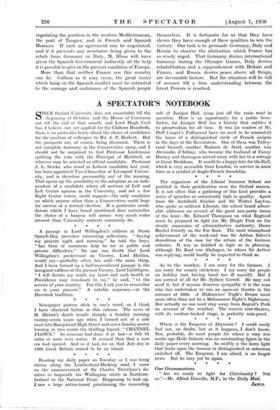A SPECTATOR'S NOTEBOOK S INCE Oxford University does not reassemble till
the beginning of October, and the House of Commons not till the end of that month, and Lord Hugh Cecil has, I believe, not yet applied for the Chiltern Hundreds, there is no particular hurry about the choice of candidates for the position of colleague to Mr. A. P. Herbert. But the prospects are, of course, being discussed. There is not complete harmony in the Conservative camp, and I should not be surprised to find Professor Lindemann splitting the vote with the Principal of Hertford, or whoever may be selected as official candidate. Professor J. L. Stocks, who stood as Labour candidate last year, has been appointed Vice-Chancellor of Liverpool Univer- sity, and is therefore presumably out of the running. That opens up the possibility of the adoption as an inde- pendent of a candidate whom all sections of Left and Left Centre opinion in the University, and not a few Right Centre voters, could support—the only condition on which anyone other than a Conservative could hope for success at a normal election. If a particular candi- dature which I have heard mentioned does materialise the choice of a burgess will arouse very much wider interest than University contests commonly do.
* A passage in Lord Willingdon's address at Stowe Speech-Day provokes interesting reflections. " Saying my prayers night and morning," he told the boys, " has been of enormous help to me in public and private difficulties." No one can doubt that Lord Willingdon's predecessor as Viceroy, Lord Halifax, would say—probably often has said—the same thing. And I have turned up a half-remembered passage in the inaugural address of the present Viceroy, Lord Linlithgow. " I will devote my mind, my heart and such health as Providence may vouchsafe to me," he said, " to the service of your country. For this I ask you to remember me in your prayers." A notable sequence,—in the Havelock tradition.
* * Newspaper posters stick in one's mind, as I think I have observed before in this column. The news of M. Bleriot's death recalls sharply a Sunday morning twenty-seven years ago when I turned out of a side road into Hampstead High Street and saw a Sunday poster bearing in two words the thrilling legend, " CHANNEL FLOWN." So someone had done it at last—a full 22 miles or more over water. It seemed then that a new era had opened. And so it had, for on that July day in 1909 Great Britain ceased to be an island.
* * * * Reading my daily paper on Tuesday as I was being driven along the Leatherhead-Dorking road, I came on the announcement of Sir Charles Trevelyan's de- cision to bequeath his Wallington estate in . Northum- berland to the National Trust. Happening to look up, I saw .a large notice-board proclaiming the impending sale of Juniper Hall, lying just off the main road in question. Here is an opportunity for a public bene- factor, for Juniper Hall has a history that entitles it to preservation for all time. It was (as readers of Mr. Duff Cooper's Talleyrand have no need to be reminded) the home of a distinguished circle of French emigres in the days of the Revolution. One of them was Talley- rand himself, another Madame de Stael, another was Alexandre d'Arblay, who became the husband of Fanny Burney and thereupon moved away with her to a cottage at Great Bookham. It would be a happy fate for the Hall, which is very accessible from London, to survive in some form as a symbol of Anglo-French friendship.
• * * The organisers of the Liberal Summer School are justified in their gratification over the Oxford session. It is not often that a gathering of this kind provides a series of speeches so consistently high in quality. Apart from Sir Archibald Sinclair and Sir Walter Layton, who spoke as militant Liberals, the school heard admir- able addresses on several of the great non-party issues of the hour—Mr. Edward Thompson on what England must be prepared to fight for, Mr. Dingle Foot on the steady expansion of administrative authority, Dame Rachel Crowdy on the Far East. The most triumphant achievement of the week-end was Sir Arthur Salter's demolition of the case for the return of the German colonies. It was as finished in logic as in phrasing, although Dr. Karl von Abshagen, to whom Sir Arthur was replying, could hardly be expected to think so.
* * * * As to the weather. I am sorry for the farmers. I am sorry for county cricketers. I am sorry for people on holiday (not having fared too ill myself). But I am 'sorriest of all for Mr. Sydney Carroll. He may not need it, but if anyone deserves sympathy it is the man who has undertaken to run an open-air theatre in ' the summer of 1936. A Midsummer Night's Dream must more often than not be a Midsummer Night's Nightmare. But actually no one need stay away from Regent's Park on account of the weather. The reserve tent-theatre, with its verdure-backed stage, is perfectly rain-proof.
* * * Where is the Emperor of Abyssinia ? I could easily find out, no doubt, but as it happens, I don't know. Nor, probably, do most people for whom a very few weeks ago Haile Selassie was an outstanding figure in the daily paper every morning. So swiftly is the fierce light that beats upon the famous or distinguished or notorious switched off. The Emperor, I am afraid, is no longer news. But he may yet be again.
* - * * * Our Grammarians " Are we ready to fight for Christianity Not us."—Mr. Alfred Denville, M.P., in the Daily Mail.
Jealus.






































 Previous page
Previous page